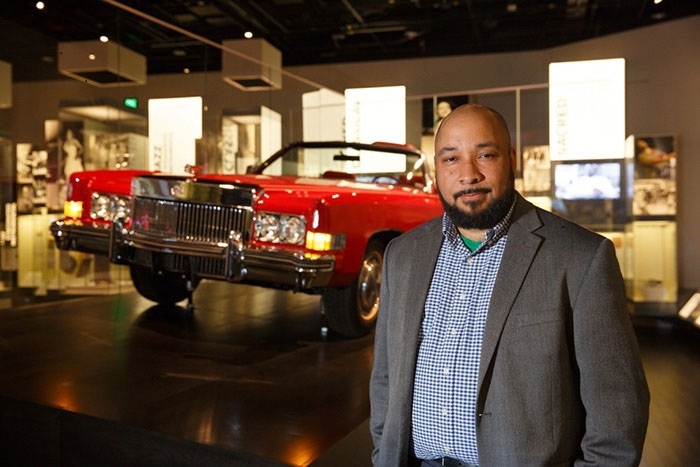As part of the Pryor Center Presents lecture series, Kevin Strait, museum curator at the Smithsonian's National Museum of African American History and Culture, will present "A People's Journey – Curating African American History and Culture in a National Museum" at 6 p.m. today, Wednesday, Nov. 6, at The David and Barbara Pryor Center for Arkansas Oral and Visual History in the J. William Fulbright College of Arts and Sciences. This event is sponsored by the Department of Communication.
Strait's 45-minute talk will focus on the curatorial aspects of museum work, providing insight into specific acquisitions, objects and stories, and the creation of a National Museum focused on African American history and culture.
Strait began working in 2010 in the Office of Curatorial Affairs on the research, development and acquisition of objects for several of the museum's permanent exhibitions including the interpretive spaces of the Sweet Home Café, Musical Crossroads and the Power of Place. Strait oversees collections related to segregation, 20th century political and social history and popular culture.
Currently, he is developing an exhibit on Afro-Futurism, scheduled to open in 2022. Strait is a graduate of Wesleyan University and received his Ph.D. in American Studies at the George Washington University.
Upcoming Pryor Center Events
Nov. 1 – Performance by Like Butta'
Like Butta', a trio made up of Morty and Melody Mortenson and Jim Jernigan, plays an eclectic blend of Americana music including some jazz, R&B and international folk tunes dated from 1855 to today.
Nov. 14 – Pryor Center Presents Billy Fleming – "Climate, Design, and the Green New Deal"
Fleming's work is focused on the intersection of science, politics and design as they pertain to climate change. Most recently, his research has focused on the use of nature-based strategies in climate adaptation planning along the American coast.
Dec. 11 – Pryor Center Presents George Sabo – "Excavation in the Backyard of the Crescent Hotel"
Sabo, director of the Arkansas Archeological Survey, will talk about the excavation of artifacts behind the Crescent Hotel in Eureka Springs.
The Pryor Center is located at 1 East Center Street, Suite 120, and parking is available on the Fayetteville Square. The events are free and open to the public. Go to pryorcenter.uark.edu to add the Pryor Center events calendar to yours.
About the The David and Barbara Pryor Center for Arkansas Oral and Visual History: The David and Barbara Pryor Center for Arkansas Oral and Visual History is an oral history program with the mission to document the history of Arkansas through the collection of spoken memories and visual records, preserve the collection in perpetuity, and connect Arkansans and the world to the collection through the Internet, TV broadcasts, educational programs, and other means. The Pryor Center records audio and video interviews about Arkansas history and culture, collects other organizations' recordings, organizes these recordings into an archive, and provides public access to the archive, primarily through the website at http://pryorcenter.uark.edu. The Pryor Center is the state's only oral and visual history program with a statewide, seventy-five county mission to collect, preserve, and share audio and moving image recordings of Arkansas history.
About the J. William Fulbright College of Arts and Sciences: The J. William Fulbright College of Arts and Sciences is the largest and most academically diverse unit on campus with three schools, 16 departments and 43 academic programs and research centers. The college provides the core curriculum for all University of Arkansas students and is named for J. William Fulbright, former university president and longtime U.S. senator.
About the University of Arkansas: The University of Arkansas provides an internationally competitive education for undergraduate and graduate students in more than 200 academic programs. The university contributes new knowledge, economic development, basic and applied research, and creative activity while also providing service to academic and professional disciplines. The Carnegie Foundation classifies the University of Arkansas among only 2 percent of universities in America that have the highest level of research activity. U.S. News & World Report ranks the University of Arkansas among its top American public research universities. Founded in 1871, the University of Arkansas comprises 10 colleges and schools and maintains a low student-to-faculty ratio that promotes personal attention and close mentoring.
Topics
Contacts
William Schwab, executive director
Pryor Center for Arkansas Oral and Visual History
479-575-5181, bschwab@uark.edu
Andra Parrish Liwag, director of communications
J. William Fulbright College of Arts and Sciences
479-575-4393, liwag@uark.edu
